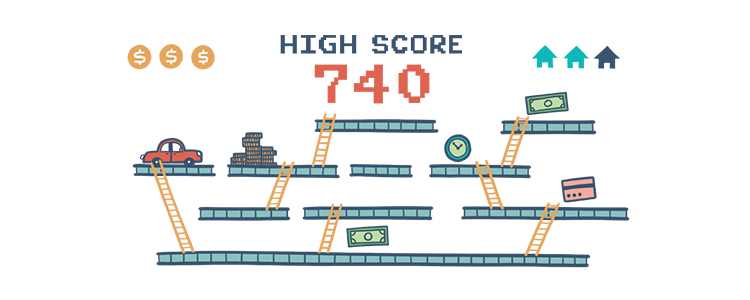Improve Your Credit History

First-time borrowers often have anxiety about low credit scores. They may not have a history of borrowing because they're young, they've never taken out a loan, or even had a credit card.
If you’re getting ready to shop for home mortgages, or any kind of large loan it’s a good idea to begin working on your credit history and getting that score up. To do that, it’s important to know the factors that affect your FICO score:
- Making payments on time: 35%
- Overall debt: 30%
- Length of credit: 15%
- New credit applications: 10%
- Types of credit: 10%
Know Your Score
You can only fix something when you know it’s broken, and knowing your credit score is the first step to helping it go up. Under the Fair Credit Reporting Act, you have a right to request your own credit report from a credit bureau to review it. This allows you to dispute any errors by writing to the relevant credit bureau, which must investigate the dispute within 30 days.
Start Building Credit
Starting a credit history is as simple as signing up for a credit card. Use a credit card to pay for everyday items and set up utility bill payments online through a credit card account in your name. Keep in mind to avoid accumulating debt by paying off the balance in a timely manner.
Don’t Let Your Balance Go Past-Due
Your payment history makes up 35% of your score, making it the most important factor of your credit. The more behind you are on your payments, the more it hurts your credit score. Try to pay off your outstanding balances in full rather than carrying it forward. In addition to avoiding interest payments, it will reflect favorably on your credit report when a lender updates your account status to "paid in full."
Don't Use ALL Your Credit
A key to scoring favorably on your credit is leaving most of it unused. Experts agree that if you use no more than 30% of your available credit, it affects your credit score positively. For example, if you have a 3 credit cards, two with a limit of $1,500 and one with a limit of $2,000, you have $5,000 total credit available. Keeping your combined balance under $1,500 (30% of $5,000) will help maintain a good credit score, because it shows lenders that you are able to use your given credit responsibly.
Avoid Applying for More Credit
When you apply for a new line of credit, lenders perform what is called a “hard inquiry” into your credit. This review of your credit itself affects your score. Applying for credit a number of times in a short timeframe sends a red flag to lenders who might assume that you’re in dire financial straits. So, if you are in the process of repairing a low credit score, avoid making any new applications for credit.

FHA Loan Articles
September 13, 2023FHA rehab loans are a specialized type of mortgage loan offered by the Federal Housing Administration that allows borrowers to finance both the purchase or refinance of a home and the cost of needed repairs.
September 8, 2023Borrowers considering an FHA loan should be familiar with some basic loan terminology. These loans are popular among first-time homebuyers and those with lower credit scores because they often offer more flexible eligibility requirements and lower down payment options.
August 27, 2023The Federal Housing Administration has specific credit requirements and guidelines for borrowers looking to buy or refinance homes with an FHA loan. In addition to what FHA guidelines state, lenders may have more stringent requirements that may vary from one lender to another.
August 23, 2023Mortgage APR (Annual Percentage Rate) and a loan's interest rate are two different things, although they are closely related. Understanding the difference is an important part of a borrower's analysis of the true cost of their mortgage.
August 19, 2023FHA refinance loans allow homeowners with existing FHA loans to refinance their mortgages. These loans are designed to help borrowers take advantage of lower interest rates, reduce their monthly mortgage payments, or access equity in their homes for various purposes.
August 14, 2023FHA loans typically require a minimum down payment of 3.5% of the purchase price of the home with the right credit score. This means that if you're buying a house for $240,000, you would need to make a down payment of at least $8,400.








